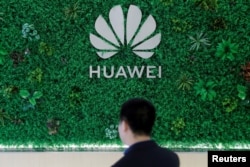The chairman of the top U.S. telecoms regulator on Wednesday announced his opposition to allowing China Mobile to operate in the United States, citing risks to American national security.
The statement from Federal Communications Commission Chairman Ajit Pai could mark the beginning of the end for the Chinese telecoms giant's eight year effort to crack the U.S. market.
China Mobile — the world's largest mobile operator with nearly 930 million customers as of February — first filed an application for permission to operate in the United States in 2011.
Composed of Democrats and Republicans, the five-member FCC next month is due to vote on an order that, if approved, would deny China Mobile's request to operate.
"Safeguarding our communications networks is critical to our national security," Pai said in a statement.
Evidence, including that submitted by other federal agencies, Pai added, made it "clear that China Mobile's application to provide telecommunications services in our country raises substantial and serious national security and law enforcement risks."
Chinese tech firms — such as Huawei and ZTE — have faced stiff resistance from U.S. government agencies, which have described them as security threats.
Washington has barred the Chinese networking equipment company Huawei from developing the new ultra-fast 5G mobile network in the United States and has blocked U.S. government purchases of its services.
American officials have sought to persuade allied countries to do likewise.






